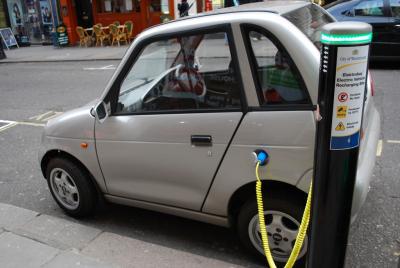
#Transports: Automotive/ Aerospace
How electric vehicles can support grid flexibility and utility revenues
The main value that EVs provide to utilities is flexibility
As more renewable resources keep getting added to power grids, peak demand patterns have been shifting -- and many utilities are racing to adapt their operations. Electric vehicles offer ample opportunities to help utilities enhance reliability, implement demand response, and even develop new revenue streams.
The 2014 industry review by the American Council on Renewable Energy, Evolving Business Models for Renewable Energy includes an article by Chris King, Global Chief Regulatory Officer for Siemens Smart Grid Services: Electric vehicles: flexibility, creativity and profit potential for utilities (p. 29).
King notes: "Pilot programs and research in the U.S. and elsewhere are demonstrating the value of EVs, and also yielding practical lessons for large-scale EV deployment and vehicle-to-grid strategies. EVs also are crucial to developing a network of microgrids to enhance reliability and manage demand."
The main value that EVs provide to utilities is flexibility. "The grid needs to be far more flexible, mostly on the demand side, in order to respond to growing fluctuations in available power," said King. "Widely deployed EVs can supply much of this flexibility. EVs can help minimize the need to build new power plants, enhance large-scale demand response, and ultimately even reduce wholesale power prices."
As long as an EV is plugged in, it can be charged at any time. Utilities could incorporate EV charging into voluntary consumer programs -- not just for demand response, but also to draw on power stored in EV batteries during times of low power availability, or for emergency home power during outages. "All of this can be achieved without sacrificing the paramount consumer priority of on-demand transportation," said King.
Time-of-use rates and special EV charging rates can support using EVs as flexible grid resources.
Utilities also can play a key role in expanding EV charging infrastructure -- an investment with significant potential for long-term revenue gains. Currently, companies such as ChargePoint operate networks of charging stations situated in business or public parking locations. Frequently, they provide TOU pricing to their customers.
While utilities often assist with or promote third-party charging infrastructure, there's no reason why they couldn't deploy their own network of charging stations. These could even allow customers to add to their monthly utility bill the cost to top off their car battery at charging stations in the utility's network.
"Utilities and regulators can work together to realize the full potential of EVs in the smart grid," said King. "Investments in EVs and their associated infrastructure are likely to do more than just help utilities stay competitive. They are likely to yield considerable returns -- while also giving consumers valuable options and peace of mind, and while addressing environmental concerns."
